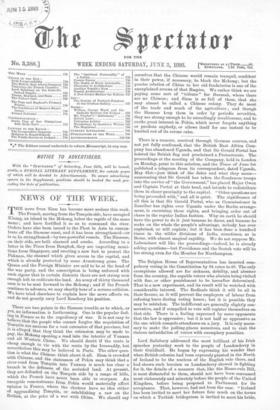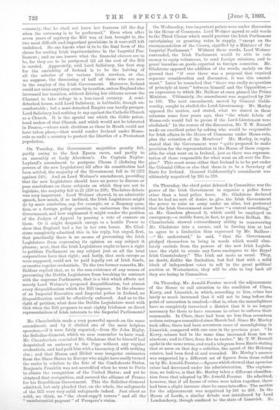Lord Salisbury addressed the most brilliant of his Irish speeches
yesterday week to the people of Londonderry in their Guildhall. He began by expressing his wonder that when British colonies had been expressly planted in the North of Ireland to be the nucleus of the English rule there, and bad shown such heroism as Londonderry showed in fighting for it, the details of a measure that, like the Home-rule Bill, is most distasteful to them, should not have been canvassed moat elaborately and minutely before the people of the United Kingdom, before being proposed to Parliament for its acceptance. That, however, bad not been the case. "Ireland has been invited to meet her future fate much on the terms on which a Turkish bridegroom is invited to meet his bride, —namely, that he shall not know her features till the day when the ceremony is to be performed:' Even when after seven years of mystery the Bill was at last, brought in, the two most difficult and important provisions in it were still left undefined. No one knows what is to be the final form of the clause for seating Irish representatives in the Imperial Par. liament ; and no one knows what the financial clauses are to be, for they are to be postponed till all the rest of the Bill is carried. Apparently, said Lord Salisbury, the first step for the enriching of Ireland is to be the halving of all the salaries of the various Irish services, or else, we suppose, the dismissing of half of those who are now in the employ of the Irish Government. Moreover, Ireland could not raise anything extra by taxation, unless England also increased her taxation, without driving her citizens across the Channel to take refuge in a less-taxed country. A semi- detached house, said Lord Salisbury, is habitable, though un- comfortable; but a semi-detached Empire can hardly prosper. Lord Salisbury had nothing to say against the Catholic Church as a Church. It is the special use which the Celtic priest- hood makes of that Church, and which would not be tolerated in France,—where such elections as those in Meath could not have taken place,—that would render Ireland under Home- rule so unfit a country to protect the liberties of a Protestant population.







































